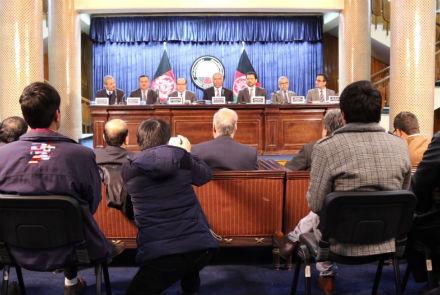Homaion Qiomi, President Ashraf Ghani’s advisor on infrastructure on Tuesday said Uzbekistan companies are ready to invest in certain sectors including energy, agriculture, road construction and railway in Afghanistan.
“Uzbekistan has good technical capacities and can invest in different sectors in Afghanistan,” he said.
Qiomi had been speaking at an Uzbekistan-Afghanistan trade relations conference in Kabul on Tuesday.
Also at the conference was minister of commerce and industries Homayun Rasa, who said importing goods from Uzbekistan is quick and currently Afghanistan-Uzbekistan trade exchanges total more than $300 million USD annually.
“When we import goods from Pakistan, it takes nineteen days, but when we import from Uzbekistan, it takes nine days,” said Rasa.
Rasa also stated that in the near future a trade agreement will be signed between the two countries and that many of the private sector’s problems will be resolved when the agreement is signed.
Mahmoud Baligh, the acting minister of public works, meanwhile said once the agreement was in place, construction materials will be imported from Uzbekistan and that Uzbek companies will invest in road construction, bridges and railways in the country.
“We asked Uzbek companies to invest in road construction, railways and other sectors,” he said.
Acting minister of transport and civil aviation, Mohammadullah Batash also said Afghanistan had agreed with Uzbekistan to establish joint-transportation companies.
Ferozuddin Feroz, minister of public health said Uzbekistan has good quality medicine and that some necessary medicines will be imported from Uzbekistan.
“Uzbekistan has better quality medicines than some countries and this year a big part of the necessary medicine for government hospitals will be imported from Uzbekistan,” he said.
Statistics show that in 2016 Afghanistan’s export increase by 12 percent while its imports have decreased.

